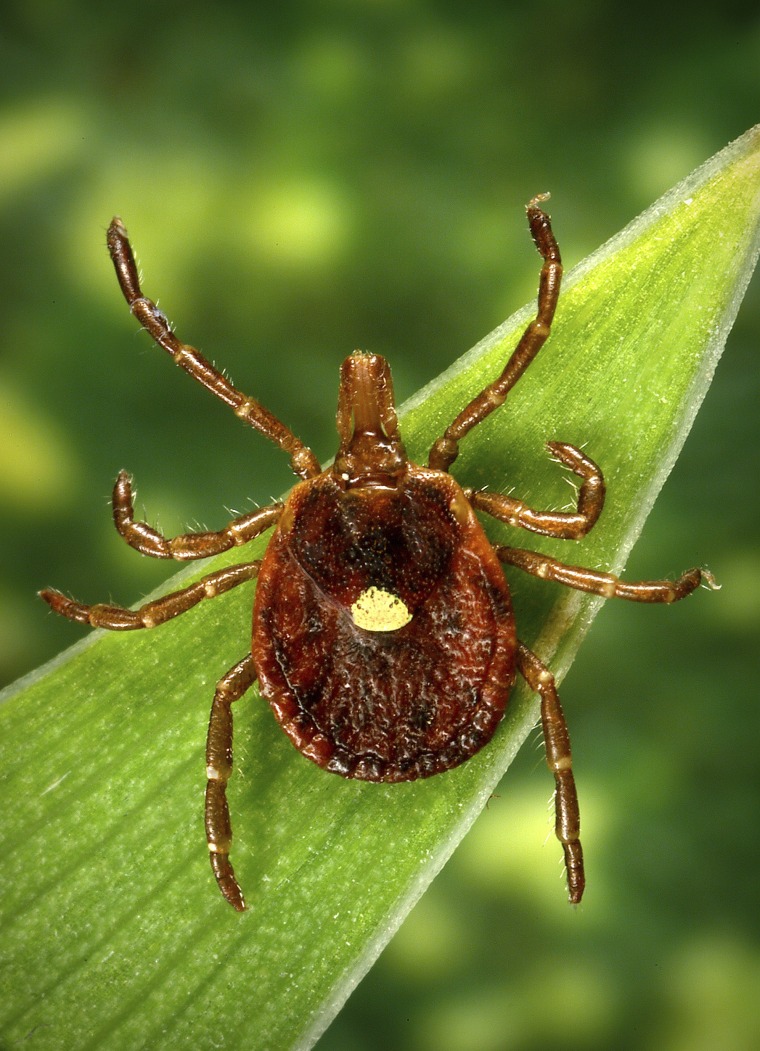People who have serious but mysterious allergy attacks might be suffering from a meat allergy caused by a tick bite, government researchers said Tuesday.
They’ve been running a study on unexplained attacks of anaphylaxis — the life-threatening response to a true allergy. Close to 10 percent of the people recruited so far for the study turned out to have an allergy that’s transmitted by a tick.
"Alpha-gal allergy appears to be yet another reason to protect oneself from tick bites," said Dr. Anthony Fauci, director of the National Institute of Allergy and Infectious Diseases (NIAID).
"Food allergies can range from an inconvenience to a life-threatening condition and pose a serious and growing public health problem that urgently requires more research."
The ticks, called Lone Star ticks, carry a sugar molecule that humans don't have, called galactose-a-1,3-galactose, or alpha-gal for short.
Related: Allergies to red meat linked to tick bites are on the rise
Many mammals, but not humans, also carry this sugar in their bodies so it is found in red meat — beef, pork, venison, rabbit — and even some dairy products.
Most people don’t have a problem eating it as the food gets digested.
But a tick bite triggers an immune system response. One theory on how a tick bite could transmit an allergy: when the tick transmits alpha-gal in its bite, immune cells react to it. That sets the stage for an allergic reaction the next time the person eats red meat.
The team studying unexplained allergic attacks found that six out of the 70 people they’ve studied so far had an alpha-gal allergy.
When they stopped eating red meat, their attacks stopped.
It’s hard to diagnose alpha-gal allergy because it doesn’t cause the same symptoms that most allergies do, the researchers said. Allergic reactions to peanuts, for instance, or shellfish, begin about five minutes to half an hour after someone eats or breathes in the food.
It takes several hours for a reaction to meat, however.
RELATED: Tick-related meat allergies surge in the Southwest
"This unusually long time gap between a meal and an allergic reaction is probably a big reason that alpha-gal allergies are often initially misdiagnosed," said NIAID’s Dr. Dean Metcalfe. "If you start to have trouble breathing in the middle of the night, you probably are not going to blame the hamburger you had for dinner."

It’s not known how common alpha-gal allergy is but in 2016 Dr. Scott Commins of the the University of North Carolina, Chapel Hill said he had identified 3,500 cases.
"We often think of ticks as carriers of infectious diseases, such as Lyme disease, but the research strongly suggests that bites from this particular species of tick can lead to this unusual allergy," said NIAID’s Dr. Melody Carter, who helped lead the study.
"The association is increasingly clear, but we still need to discover exactly how these two events are linked and why some people with similar exposure to tick bites seem to be more prone to developing alpha-gal allergy than others.”
About half of all cases of anaphylaxis have no clear cause, Carter’s team said.
RELATED: New tickborne virus hits Missouri farmers
“These cases are called idiopathic anaphylaxis. There is no cure or long-term preventive therapy for patients with recurrent episodes of idiopathic anaphylaxis,” they wrote.
But ticks are causing more and more disease. Lyme disease is becoming increasingly common, but so are rare tickborne diseases such as the Heartland and Bourbon viruses, respectively.
A team at the Centers for Disease Control and Prevention reported this week that they found Bourbon virus in several batches of ticks collected in Missouri. Two people have been diagnosed with Bourbon virus infection. In 2014, there was one reported death as a result of the virus in Kansas.
It’s the first time the virus has been found in Missouri, and in a species of ticks known to aggressively bite humans, they reported.
“Tickborne diseases are becoming a serious problem in the United States as people increasingly build homes in formerly uninhabited wilderness areas where ticks and their animal hosts live,” NIAID says.
